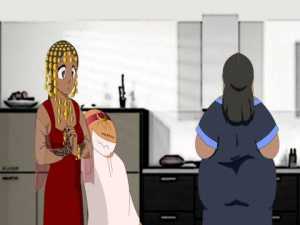In light of the recent completely unnecessary and distracting drama with Bashir & South Africa, I have decided to turn our national attention back to the most critical topic in Sudan: weddings. After all, weddings are the closest thing we have to a national sport, so let’s focus on what’s really important please.
The first and most important step in planning a wedding in Sudan is to make sure you were never exposed to any wedding outside of Sudan, ever. Any exposure will only cause severe psychological disturbances, commonly known as “expectations” and or “standards.” If you or any loved ones have been exposed to a wedding outside of Sudan in the past 5-7 years, these 10 tips will really help you banish all symptoms of “expectations” and restore your “standards” to acceptable Sudan-friendly levels.
1- Call a wedding planner, but make sure you are ready to plan the wedding. Don’t waste his/her time if you’re not interested in planning the wedding yourself. That’s not their job. Their job is to give you the illusion that you’re not in deep shit. You are. But call them anyway.
2- Collect as many image references as possible so you can have a clear visualization of exactly what you want(ed) based on any exposure you might have had to other weddings outside of Sudan. Print all references, then burn them preferably in a healing ritual to prepare you for the actual burning of these references that will happen when your plans are ‘executed’ in real life. If you want to be more efficient, burn them and cry over them while you are doing your mandatory dukhan session.
3- You will need to quickly identify a Wedding MVP, this is most likely an aunt or a friend of a friend or even a neighbor that you never answered back on whatsapp, but you about to be ride or die. The real MVP will have the numbers of all the 7ananat, all the singers, and the 411 on all other weddings– which is especially pertinent if you think of Weddings as a competitive sport. Hang on to this MVP like your life depends on her. Because it probably does.
4- Know that red means pink, fuchsia, orange, purple, and sometimes even certain shades of blue can be considered red. So don’t be demanding. Actually the more you’re comfortable with the presence of all the colors of the rainbow all at once, the more you’ll like what you see in your wedding.
5- Glitter is your friend. There is no wedding in Sudan without glitter so you better make peace with it now. If you refuse it on your wedding cake, and your dress, and your decoration, you’ll find it poured all over your face when you get your makeup done. Somehow, the glitter will find you and haunt you. Don’t fight it.
6- Speaking of makeup, the makeup artist knows best. And what’s best is the tranny/drag queen look. It’s so in, have you not seen Caitlyn Jenner? So gorg. And what’s a bride really other than a glorified drag queen?
7- Your guests can do what they want dammit, so don’t you think of telling them about no dress code, or who/how many people they can or can’t bring, or what time to arrive, or where to sit. Have some respect; it’s their special day.
8- All videographers and photographers in Sudan are pure artistical geniuses, this is why you shouldn’t object to any highly creative montages on your wedding DVD that could include but not limited to: you and your groom’s faces merged into hearts, white doves flying in the middle of the screen throughout your wedding video, flowers in every frame (probably of all colors of the rainbow.) If you didn’t want any of that, why did you hire a PROFESSIONAL?
9- Also, the video team is trained by common sense that the most light skinned girl in the wedding must be the bride, so if you didn’t stay out of the sun and do khaltat bayad al thalj for 7,500 days before your big day, don’t blame anyone but yourself if the camera man focuses on other light-skinned girls instead of you. Ain’t nobody got time for your dark skinned problems. It’s probably also why the makeup artist had to dump a kilo of glitter on your face, so be grateful. If not to her, then at least to your groom who accepted marrying you bi loanik da.
10- If you didn’t notice that there aren’t 10 tips on this list or you don’t mind that there weren’t 10 things as the title promised, that means you’re not detail-oriented and you will be much better suited for a wedding in Sudan. Mabrook in advance بيت مال و عيال
PS Weddings in Sudan really are the best, definitely not aesthetically speaking, but you know what I mean.



